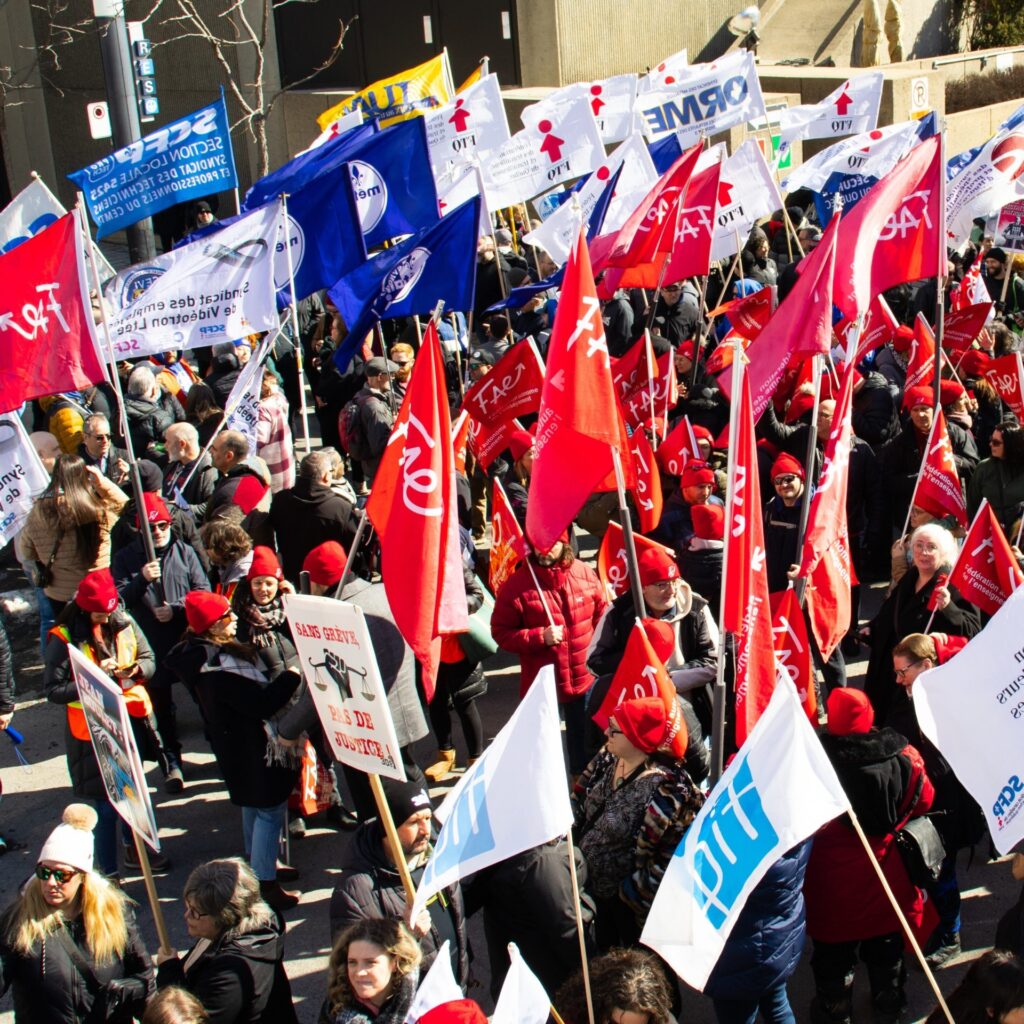Ever since pro-business Minister Jean Boulet tabled Bill 89 on February 19, Quebec’s major labour unions have been steadily declaring their opposition to it. Described as a “gift to the bosses,” the bill aims to limit the right to strike by allowing the government to put an end to it if it “causes or threatens to cause serious prejudice”-a vague definition open to abuse, and which would run counter to the Canadian Charter of Rights and Freedoms.
Central labour bodies (mainly the FTQ and CSN) organized a short, festive occupation of the Ministry of Labour offices, welcome demonstrations for the Minister at various events in Quebec, publicity actions and, above all, a landmark action on March 14 in front of the Board of Trade of Metropolitan Montreal. Jean Boulet was there to present his project to the Montreal business community.
Simon Biard, elected delegate of the Union of blue-collar city workers of Montreal (SCFP–301), actively participated in his union’s reaction to Bill 89 on March 14. A blue-collar worker for more than 15 years, he shared his views on the central labour bodies’ strategy against the bill with The North Star.
“What I often denounce is that our union or inter-union mobilization actions don’t often represent a real danger, don’t really challenge the system. But March 14 was new, because there was a degree of strategy and a degree of creativity that we’d never seen before.”
Dozens of trade unionists had slipped discreetly inside the event, dressed in full suits so as not to be noticed. Once there, they began to disrupt in small groups, taking turns making noise. When one group was expelled, another would appear.
Meanwhile, outside, other demonstrators, visibly angry and threatening, tried to force their way in. The tension was palpable, and it was the combination of disorder inside and pressure outside that forced the organizers to cancel the event.
“It was the first time in 16 years that such an event had been cancelled. The minister was exfiltrated by a small procession of black armoured SUVs with tinted windows! So it was a success on every level.”

In response to the union action, riot police were called in and tear gas was used. Biard believes that it is normal for the government to call in the police to suppress the union movement at a time like this:
“If they feel that their plan is slipping a little under their feet, they will try through the armed wing that is the police to dissuade the workers, to scare them, to make them back down.”
So far, the union centrals’ strategy has consisted of a few disruptive actions, spreading and supporting a petition calling on the CAQ government to withdraw the bill, and promising a legal challenge if it passes.
But Biard doesn’t think that’s enough. The legal challenge “is going to take years and years and years. Then, if the workers end up winning, the practices will have already become part of the tradition and will already represent a step backwards for the workers.”
He adds that, despite the rhetoric of the central labour bodies, no real mass resistance movement is being built.
Biard and the blue-collar workers advocate broad mobilization, social strike action and civil disobedience as their fighting tools. Their union passed a resolution to this effect at the just-concluded SCFP–Québec convention.
He also points out that Bill 89 joins others already adopted by the CAQ attacking workers’ rights and privatizing the social services and infrastructure they have fought for. He sees this series of regressive laws as an integral part of the current social and economic system.
“You have to see capitalism as an evolution, as something that can be analyzed, described and even predicted. So, capitalism has reached a stage in its evolution where, to maintain its accumulation of capital, to maintain its profit margins, it must proceed with projects of social regression. So we’ve reached this point, and it’s nothing new. It’s been going on for several years now.
Biard puts forward a final point: “We need to build a large-scale network of struggle, a large-scale network of solidarity, where workers would stand together, fighting not just for the improvement of their working conditions as units of employees, but also fighting for projects of social progress and also to curb projects of social regression.”

Be part of the conversation!
Only subscribers can comment. Subscribe to The North Star to join the conversation under our articles with our journalists and fellow community members. If you’re already subscribed, log in.